

More Evidence That MOOCs Are Not Great Equalizers. A survey by researchers at the University of Pennsylvania reveals that the majority of students enrolled in Coursera's massive open online courses or MOOCs are employed, degree-holding men.
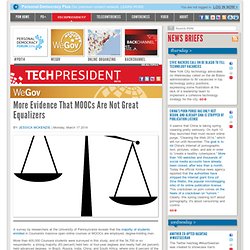
More than 400,000 Coursera students were surveyed in this study, and of the 34,700 or so respondents: a strong majority (83 percent) held two- or four-year degrees and nearly half (44 percent) held advanced degrees. In Brazil, Russia, India, China, and South Africa, where only 6 percent of the population has earned a college degree, nearly 80 percent of Coursera students are college graduates and from the wealthiest echelons of society. If anything, this shows that MOOCs are widening the educational divide, not leveling the playing field, as some have claimed. Gayle Christenson and Brandon Alcorn of Global Initiatives at the University of Pennsylvania write that there is a significant gender divide as well. Demystifying MOOCs: An Eye-Opening Ethnographic Study of Online Education. Christina Wasson (Professor of Anthropology, University of North Texas) investigates communication, collaboration, and community-building in face-to-face and virtual settings.
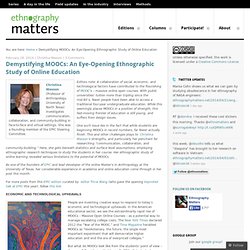
She was a founding member of the EPIC Steering Committee. Editors note: A collaboration of social, economic, and technological factors have contributed to the flourishing of MOOC’s – massive online open courses. With public universities’ tuition more than tripling since the mid-80’s, fewer people have been able to access a traditional four-year undergraduate education. The First e-Literate TV Episode Is Up! Phil and I are thrilled to announce the release of our pilot e-Literate TV episode.
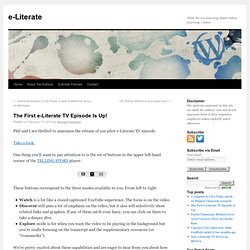
Take a look. One thing you’ll want to pay attention to is the set of buttons in the upper left-hand corner of the TELLING STORY player: These buttons correspond to the three modes available to you. From left to right: Watch is a lot like a closed captioned YouTube experience. Studying user experience and engagement in Coursera. Completion Rates Aren’t the Best Way to Judge MOOCs, Researchers Say – Wired Campus - Blogs. When it comes to measuring the success of an education program, the bottom line is often the completion rate.
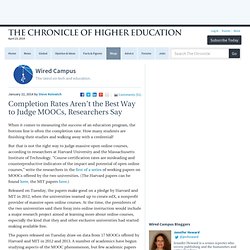
How many students are finishing their studies and walking away with a credential? But that is not the right way to judge massive open online courses, according to researchers at Harvard University and the Massachusetts Institute of Technology. “Course certification rates are misleading and counterproductive indicators of the impact and potential of open online courses,” write the researchers in the first of a series of working papers on MOOCs offered by the two universities. (The Harvard papers can be found here, the MIT papers here.) Released on Tuesday, the papers make good on a pledge by Harvard and MIT in 2012, when the universities teamed up to create edX, a nonprofit provider of massive open online courses. The papers released on Tuesday draw on data from 17 MOOCs offered by Harvard and MIT in 2012 and 2013.
MOOC Student Demographics (Fall 2012) I report on survey responses from 2,350 students who enrolled in a Massive Online Open Class (MOOC) titled “Computational Investing, Part I” via coursera.org in Fall 2012.
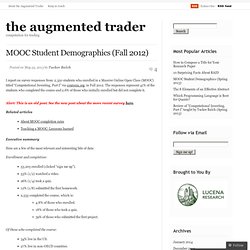
The responses represent 41% of the students who completed the course and 2.6% of those who initially enrolled but did not complete it. Alert: This is an old post. See the new post about the more recent survey here. Related articles Executive summary. RPA Journal » Studying Learning in the Worldwide Classroom: Research into edX’s First MOOC. Review: Sir John Daniel on MOOCs, Online Learning, and Quality. As part of the transformation of teaching and learning in higher education, decisions are being made on the type and scope of online learning and whether to participate in MOOCs—a specific form of online learning. Two papers about MOOCs and online learning have been published by Dallas-based Academic Partners, an academic support company.
They deserve the attention of those in colleges and universities making those decisions. What makes these specific papers important is Sir John Daniel’s participation as author or editor. Leading the UK’s Open University from 1990 to 2001, he assembled a talented and dedicated team that had to develop learning processes adapted to the needs of non-residential students, to lead the transition into learning technologies, ensure quality, and be financially successful.
A Quality Scorecard for the Administration of Online Education Programs. The Quality Scorecard full access and use is an OLC Institutional Member benefit.
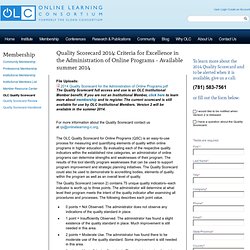
If you are not an Institutional Member, click here to learn more about membership and to register. The current scorecard is still available for use by OLC Institutional Members. Download 60 Free History Courses from Great Universities. Looking Back at the "Fundamentals of Online Education" Crash. Anyone following MOOC news in early February is well aware of the meltdown of Coursera’s Fundamentals of Online Education: Planning and Application, offered by Fatima Wirth of Georgia Tech.
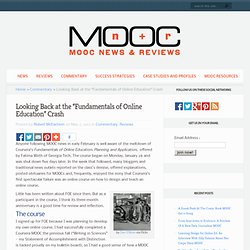
The course began on Monday, January 28 and was shut down five days later. 300 Free MOOCs from Great Universities (Many Offering Certificates) Jailbreak the Degree: Alternatives to the Certifed Transcript. MOOCs. Online learning: Campus 2.0. When campus president Wallace Loh walked into Juan Uriagereka's office last August, he got right to the point.
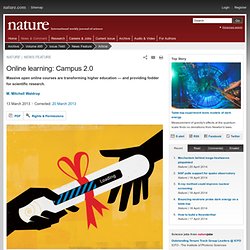
My Coursera Experience: Empowering Local Communities through MOOC. Copyright for Educators (US) This is a course for educators who want to learn about US copyright law in the education context.

P2PU also offers a similar courses for Australia, if that content is more appropriate. Educators who are not in the US are welcome to sign up, too, if they want to learn about copyright law in the US. The course is taught around practical case studies faced by teachers when using copyright material in their day-to-day teaching. Elite education for the masses. The future of learning management. People familiar with my blog will know that I’m not a member of the anti-LMS brigade.
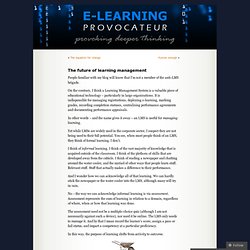
On the contrary, I think a Learning Management System is a valuable piece of educational technology – particularly in large organisations. It is indispensible for managing registrations, deploying e-learning, marking grades, recording completion statuses, centralising performance agreements and documenting performance appraisals. Free Online Course Materials. 40 Useful Tips For Anyone Taking A MOOC. As these resources have grown in number and the list of institutions providing them has become ever more prestigious, free online courses are gaining legitimacy with employers as a method of learning valuable job skills.
While there’s still a long way to go in terms of acceptance, more and more employers are recognizing the value of cheap, effective educational programs that can keep employees up-to-date and engaged in their field without spending a dime. Whether you’re looking to online education for personal reasons or to get ahead in your career, use these tips to help you get more out of open courses and use what you learn to market yourself, improve your performance, and stand out on the job.
Treat them like real classes . MOOCs are really a platform. We can officially declare massive open online courses (MOOCs) as the higher education buzzword for 2012. Between Coursera, edX and smaller open course offerings, nearly $100 million in funding has been directed toward MOOCs in that past 8 months. Keeping MOOCs Open. MOOCs — or Massive Open Online Courses — have been getting a lot of attention lately.
Just in the last year or so, there’s been immense interest in the potential for large scale online learning, with significant investments being made in companies (Coursera, Udacity, Udemy), similar non-profit initiatives (edX) and learning management systems (Canvas, Blackboard). The renewed interest in MOOCs was ignited after last year’s Introduction to Artificial Intelligence course offered via Stanford University, when over 160,000 people signed up to take the free online course. The idea of large-scale, free online education has been around for quite some time.
Some examples include David Wiley’s 2007 Introduction to Open Education; Connectivism and Connective Knowledge, led by George Siemens and Stephen Downes in 2008; Open Content Licensing for Educators; and many others.